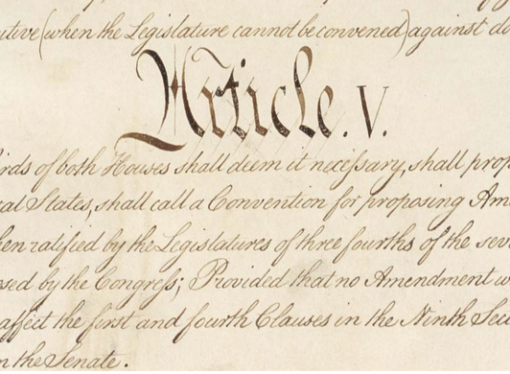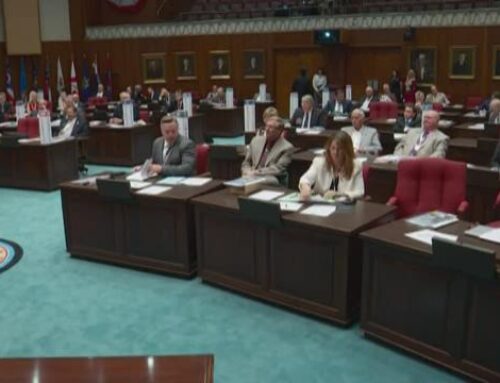A Fresh View of a Constitutional Article V Convention of States
by Paul S. Gardiner September 21, 2019
Author’s note: Conventional wisdom says that an Article V convention of states (COS) to propose constitutional amendments can and/or must be a “limited” convention where the delegates are limited and authorized to only propose, debate and vote on one or a limited set of amendments. This article presents arguments why this may not be the case.
Having served in state and national leadership positions for the Convention of States Project, I most sincerely long for an Article V COS to happen and happen very soon. I am convinced that the survivability of our great American republic depends on a successful COS that proposes critically needed constitutional amendments that ultimately are ratified into law. Due to the overall lack of meaningful Article V COS success with state legislatures in 2018, I decided to take a fresh look at several aspects of the call for a COS.
Briefly, I examined the nature of colonial conventions and the actions of early state legislators and their applications for a COS. I also looked at the writings of several notable constitutional scholars regarding a COS, and finally, what a possible future United States Supreme Court (SCOTUS) decision might be if the high court is asked to rule regarding the action or inaction of Congress after it receives 34 applications to call a COS.
Students of history know that America’s Founders established a new way to govern a nation based on federalism—shared governing power between established state/colonial governments and a new national government which existed only on paper. The intent of the Founders was to limit the power and authority of the new national government only to specific areas of responsibility.
Given the above and when considering Article V and a COS, it follows that our nation’s Founders would not want the newly devised and yet unmanned, untried national government to have any power/control whatsoever over the content of amendments proposed and debated at a convention of states called by state legislatures. But yet the modern-day Congress has been successful in either directly or indirectly controlling the calling of a COS by the states, i. e., requiring/putting COS applications in various “buckets” to ensure applications call for the same amendments, etc.
It is believed that the Founders intended for state delegates to a COS to fully be on a parity with their fellow national government peers in the manner in which any and all amendments are proposed, debated, and voted upon. The question can be asked: why would the Founders want a new, untried national government to have any say-so in any way over the amendments that state delegates could propose at a COS called by state legislatures?
In the future, it just may be that an “originalist” SCOTUS majority determines that the action of Congress (in calling for and sanctioning a limited COS) is unconstitutional, that Congress exceeded its authority by calling for a COS that effectively limits the actions of delegates. Rest assured that the well funded and very determined opposition to a COS will be aware of this potential challenge and potential SCOTUS ruling against a limited convention called by Congress.
In looking at the opinions of several notable constitutional scholars (citations below) such as Robert Natelson, Michael Stokes Paulsen, Charles Black, Walter E. Dellinger, and Russell Caplan, it became apparent that there is disagreement among these scholars about the authority of Congress to call a limited COS. In fact, four out of the above five scholars have serious reservations about Congress having authority to sanction/call a COS where convention delegates are limited to debate and vote only on a specific proposed amendment or set of proposed amendments.
Caplan states, for example, that “The illimitability theory currently holds the edge among constitutional scholars.”; Paulsen states “—neither Congress nor the States constitutionally may limit the substantive proposals of any Article V convention—.”; writing in the Yale Law Journal, Dellinger writes “—the authority to determine the agenda and to draft the amendments to be proposed should rest with the convention rather than with Congress or the state legislatures.”; and, also writing in the Yale Law Journal, Black writes “It seems to me that the most natural meaning of the words ‘a Convention for proposing Amendments’ is ‘a convention for proposing such amendments it decides to propose’ —that is, a general convention—and that the importation of a limitation not in the text is quite unwarranted.”
Regarding colonial conventions, for sure delegates most always knew beforehand what they would discuss/determine at the convention, but they had no national body to whom they had to apply to hold the convention. Thus, it is the initial period after the Constitution was ratified in 1789 that one needs to examine to see how early state legislators understood the kind of COS they could and should petition the Congress to call. A review of the Article V library reveals that during the period 1789 and 1899, there were 10 applications for a general convention to propose amendments filed with Congress: Virginia, 1789; New York, 1789; Georgia, 1833; South Carolina, 1833; Indiana, 1833; Kentucky, 1861; Ohio, 1861; New Jersey, 1861, Illinois, 1861; and Texas, 1899. The preponderance of early COS applications were for a general convention because that is what these early state legislators understood the Founders intended. This history might be used as a precedent by a SCOTUS originalist majority as part of a ruling against a Congress calling for a limited convention. It can be argued that the applications made in recent years for a limited COS were made in large part to allay the unfounded fears of obliterating the Constitution and not based on the historical record.
So, considering all the above, my conclusion is that it is not a “slam dunk” that an eventual limited COS called by the Congress, if challenged as being unconstitutional, would receive a favorable ruling from SCOTUS. Such an event would be most disappointing due to, among other things, the millions of volunteer hours and dollars spent in an effort to hold a limited COS.
A suggested, perhaps prudent alternative/additional course of action is for current Article V groups, in conjunction with key state legislators and officials, to thoroughly investigate using 34+ existing aggregated, qualifying applications to call for a general COS where any and all amendments can be proposed, debated, and voted upon. Recent analyses indicate that at least 30 such qualifying applications currently exist.
Observers of Article V matters understand that state legislatures, through the commissioning process, can control the actions of their delegates to a general COS. Further, delegates can be subject to immediate recall and fines and/or prosecution if they act outside their authority granted to them by their sponsoring legislatures.
It would appear that the various Article V groups have everything to gain and little to lose from pursuing such a strategy. Odds are that, if required, SCOTUS will have little problem blessing a general COS. If the above effort fails, the fall back position is, of course, to continue present efforts bearing in mind the risk described above of an adverse SCOTUS ruling against Congress sanctioning and calling a limited COS.
Finally, simply dismissing a general COS as an improbability without a thorough, well-funded investigation does a disservice to all Americans. Further, the American people could be potentially deprived of the use of a crucially important “checks and balances” tool purposely put into the constitution by the Founders. This must not be allowed to happen.
——————————————————————————————–
Paulsen, Michael Stokes, (2011), How to count to thirty-four: the constitutional case for a constitutional convention, Harvard Journal of Law & Public Policy, 34, 837-872.
Paulsen, Michael Stokes, (1993), A general theory of Article V: The constitutional lessons of the Twenty-Seventh Amendment, Yale Law Journal, 103, 677-789.
Dellinger, Walter E. (1979), The recurring question of the “limited” constitutional convention, Yale Law Journal, 88, 1623-1640.
Black, Charles, L., (1972), Amending the Constitution: A letter to a congressman, The Yale Law Journal, 82(2), 189-215.
Caplan, Russell L., (1988), Constitutional Brinksmanship: Amending the Constitution by national convention, (New York, NY: Oxford University Press). Paul S. Gardiner served as the initial Georgia
Convention of States Project Coalitions Director and National Veterans Coalitions Director. He is a retired Army officer, Vietnam veteran, and graduate of the University of North Carolina at Chapel Hill, University of Alabama, and the United States Army War College.


